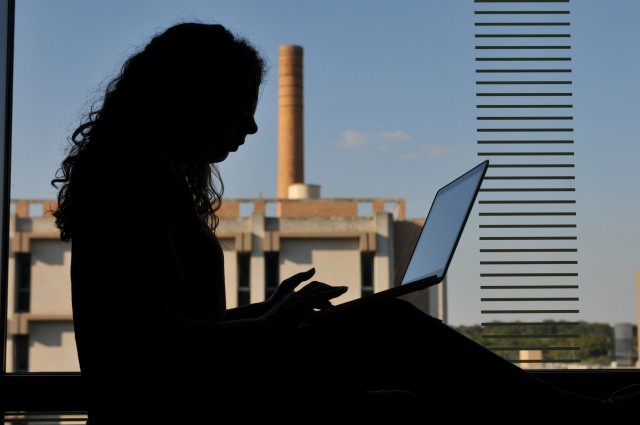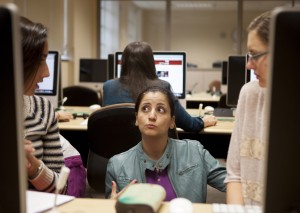Syrians at UT Face an Uncertain Future

A 26-year-old graduate student at UT from Latakia, Syria, relies on email and social media as her primary forms of communication with her family and friends back home. Photo by Gabriel Cristóver Pérez
By Reihaneh Hajibeigi
For Reporting Texas
Breema came from Syria to the University of Texas at Austin to study Middle Eastern languages and culture, but she often finds herself studying something else.
“The news can be credible at times, but Facebook is Syria for me,” the 26-year-old graduate student said. “That’s how I know what is going on with my family, my neighborhood, my town and even other cities around Syria.”
Breema worries about the safety of her family in Syria, and Reporting Texas agreed to protect her identity with a pseudonym.
Syrians at UT find themselves wondering if, after civil war and international diplomacy have run their course, they will have a home to return to. Some make a point of going back to check on things. Others struggle to get the necessary paperwork to do so. Many call on the school’s International Office and the UT community for support.
The war in Syria is between forces loyal to Syrian President Bashar Assad and those seeking to oust him. United Nations investigators recently found evidence of poison gas attacks in Syria. Although there is dispute about who is responsible for the attacks, the international community considered military retaliation, but is now moving forward with a diplomatic plan to eliminate Syria’s poison gas weapons.
Breema said she hopes the conflict will end, allowing her to return back to Syria’s tourist town Latakia as easily as she left a year ago.
Breema’s dependence on social media is helpful and minimizes her worries, but she said since talks of military intervention started, her future has become unclear.
“Everything has affected my plans so hard,” Breema said. “I was planning on going during the summer, but I couldn’t. I was planning on making my J-1 visa into an unsponsored F-1 visa, but I couldn’t. Now I have to rework my plans and figure out my future. All I know is that Syria doesn’t need more bombs dropped on its head.”
J-1 visas are for international students who receive financial support from sponsoring institutions. F-1 visas are for full-time international students who don’t rely on U.S.-based scholarships or other financial support.
While Breema’s future is unclear, she said she wants to be able to return to Syria one day to help with its education system, though she’s not sure what she would be returning to.
For those with ties to UT, the International Office is often a first stop for help. Assistant Director Margaret Luévano said the office has dealt with situations similar to Breema’s in the past.
“If students thought they wouldn’t be safe returning to their home country, they can apply for asylum,” Luévano said. “That’s always an option, and we can turn them to a lawyer or an organization who would help them with that process. We’ve had students do that from a variety of countries for a variety of circumstances, not just Syria or the Middle East.”
The International Office helps students find funds when their home country’s bank reserves are frozen, and helps them apply for changes in immigration status.
Luévano said 219 students from Middle Eastern countries have registered with the office. This includes five students from Bahrain, 16 from Egypt and 59 from Turkey—all countries that have experienced civil unrest recently.
Breema said she believed the risk was too high to go back in the summer, but nothing stopped Arabic professor Ghada Housen from going home to Tartus, Syria, when she wanted.

UT Arabic professor Ghada Housen insists on
returning to visit her Syrian hometown
despite the danger there.
“Before I went back last summer, I was always losing sleep and stressing over the safety of my family,” Housen said. “It was unbearable, but once I went back this summer, I realized the media has been painting it a lot worse than it really is.”
She said it’s not the last time she will make the trip.
“God willing, I will go back next summer, if not sooner during winter,” Housen said. “It is scary at times to be home, but nothing will stop me.”
Housen and Breema said they worry about the safety of their family and friends, but they are happy with the opportunities they found here.
“I feel like here work and life opportunities are still better,” Breema said. “While you are working, you can keep improving. At the same time, I strongly want to give what I learned here about teaching to my students back in Syria.”
Having been in Syria when protests began, Housen said she has seen a negative spiral of events. Over the past year, reports of foreign militants entering the fighting have brought into question the nature of the protests as a purely domestic movement.
“My aunt told me of a time a bus of people were driving through the town, and they had to go through a checkpoint that was set up by these al-Qaida rebels,” Housen said. “They had their faces covered with guns strapped to their chest, and if they saw anyone in police or military uniform, they would shoot them right there.”
Housen said that situation is not the home she remembers, nor is it reminiscent of the protests that initially called only for some changes in the constitution.
“I wish that Syria would return to what it was before this chaos,” Housen said. “Yes, there was corruption before, but this situation is not meant to eradicate that corruption or fix those issues. Too many foreign players are manipulating the situation.”
Breema was also in Syria during the protests, and she said she has observed two kinds of rebels in Syria, the Free Syrian Army and terrorist groups trying to exert influence.
“Even though no city is unaffected, it was pretty quiet in Latakia,” Breema said. “Recently Latakia had really bad problems because of the massacres around the villages, and everyone says those who did that were the Muslim extremists.”
Breema said if the U.S. wants peace, they would send diplomats, not bombs.
“If the U.S. really cares about the Syrian people and want peace for them, they can send a peaceful resolution to help get everyone to stop bombing,” Breema said.